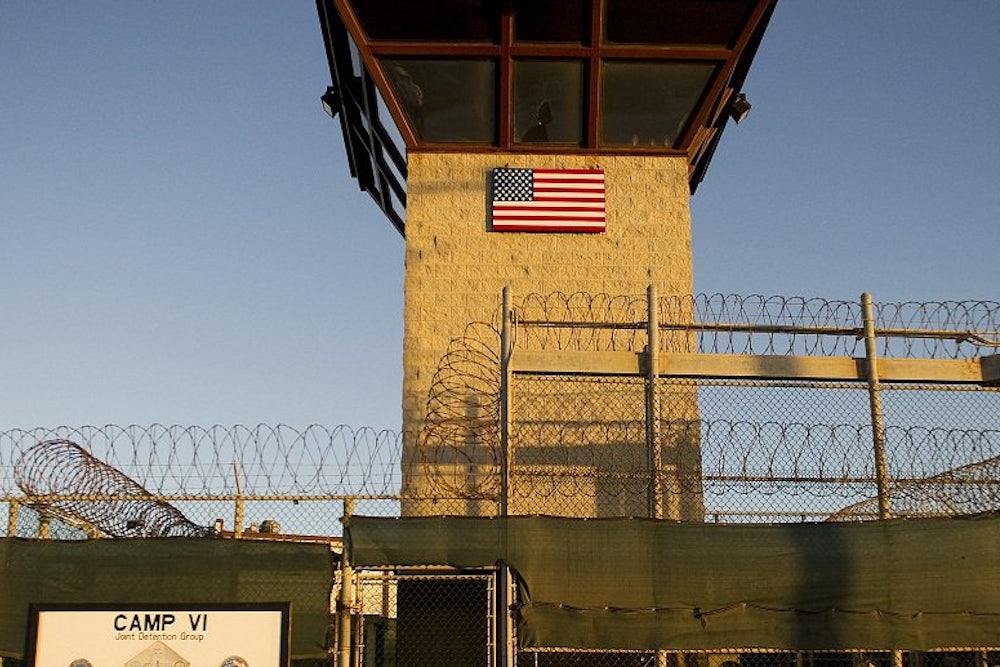More than a decade after 9/11, the “war on terrorism” continues to produce new legal questions. The Supreme Court has plenty of cases about “enemy combatants,” the Bush-era designation for detained Al Qaeda and Taliban terrorists, but it’s never had to consider Senator Lindsey Graham’s latest idea. He wants the administration to declare Dzhokhar Tsarnaev, the surviving Boston bombing suspect, as an enemy combatant, even though he’s an American citizen who was captured in the United States and hasn’t been linked to Al Qaeda. It’s a dangerous suggestion—and one the White House has rightly ignored.
The classification “enemy combatant” refers to people fighting on behalf of a state or organization at war with the United States. The term originates in Ex Parte Quirin, a U.S. Supreme Court case that upheld the authority of a military tribunal to sentence Nazi saboteurs to death. Chief Justice Harlan Stone, writing for the majority in Quirin, described enemy combatants as any armed combatant, lawful or unlawful, fighting on behalf of a state at war with the U.S. Enemy combatants violating the laws of war—the subsection of international law governing wartime conduct—are “unlawful combatants” and may be tried for their unlawful behavior, like killing civilians or passing behind enemy lines without a uniform, by military tribunals.
Six decades later, the Bush administration resuscitated the designation to describe Taliban, Al Qaeda, and other terrorist forces engaged in hostilities against the U.S., like those detained at Guantanamo Bay, Cuba. The administration argued that Al Qaeda detainees were “unlawful enemy combatants” who weren’t entitled to the protections of the Geneva Convention, since they weren’t fighting on behalf of a recognized nation-state. The Bush administration also argued that Quirin allowed the executive branch to determine the status of captured belligerents, and therefore enemy combatants didn’t have the right to challenge their status in federal courts.
The Supreme Court disagreed. Although the court upheld the executive branch’s authority to detain American citizens as enemy combatants in Hamdi v. Rumsfeld, the court found in Hamdan v. Rumsfeld that combatants are entitled to the protections of the Third Geneva Convention and can challenge their status in federal courts.
To be sure, the “war on terrorism” has blurred the already unclear definition of an enemy combatant. At first, the U.S. was fighting two organizations, the Taliban and Al Qaeda, on a relatively traditional battlefield. The United States remains at “war” with Al Qaeda, but many suspected terrorists are only loosely affiliated with the organization, or perhaps are merely tied to organizations sympathetic to Al Qaeda. The absence of a traditional battlefield where terrorists engage American military forces further clouds the issue.
The Supreme Court hasn’t weighed in on whether an American citizen captured on American soil can be detained as an “enemy combatant.” In Hamdi, Justice Sandra Day O’Connor wrote that there is “no bar” to holding an American citizen as an enemy combatant, but that the decision was limited to Hamdi’s “narrow circumstances.” He was captured carrying a weapon in Afghanistan. Although the Bush administration detained José Padilla, an American citizen suspected of plotting a dirty bomb attack, as an enemy combatant, the Bush administration transferred him to civilian courts before the Supreme Court ruled on the legality of his detention. Tsarnaev is an American citizen, and it is not clear whether the Supreme Court would uphold a hypothetical decision to detain him as an enemy combatant.
But by all accounts, including Graham’s, an enemy combatant must be fighting on behalf an organization at war with the United States. An individual committing acts of terrorism is a criminal, but someone connected to Al Qaeda is an enemy combatant—a participant in a war against the U.S. At this time, there isn’t any evidence linking the suspect to Al Qaeda or the Taliban, the two groups clearly at “war” with us. If Tsarnaev isn’t operating with either group, he cannot be an “enemy combatant”—a wartime legal status arising from the laws of war and the legislation authorizing war against the Taliban and Al Qaeda.
Yet Graham argues that Tsarnaev could be an enemy combatant, since the suspect has “radical Islamist ties” and “Chechens are all over the world fighting with Al Qaeda.” The idea of designating Tsarnaev an enemy combatant on mere suspicion—in this case, suspicion largely based on religion and ethnicity—is troubling enough. But Graham’s case for interrogating Tsarnaev as an enemy combatant isn’t legal; it's purely instrumental. He believes that intelligence officials, unconstrained by the procedures that burden the FBI, would do a better job of interrogating and extracting intelligence from Tsarnaev.
The authority to interrogate someone as an enemy combatant on suspicion isn’t entirely preposterous, since police can hold a person for questioning for 48 hours (or potentially longer, with a public-safety extension) before charging them with a crime. But no such standards exist for interrogating suspected enemy combatants, who can be detained indefinitely without a charge until the cessation of hostilities, so long as detainees can challenge their designation in federal courts and have access to counsel. Graham’s suggestion to interrogate Tsarnaev for 30 days is entirely arbitrary. If the executive branch can detain someone as an enemy combatant without evidence tying them to a terrorist organization, only Graham’s generosity prevents Tsarnaev from being held indefinitely, or at least until the federal courts rule otherwise. That process can take years.
If Graham wants to interrogate Tsarnaev as an enemy combatant, perhaps he could propose legislation allowing the government to interrogate suspected terrorists for 28 days, as has been the case in the United Kingdom. Who knows whether the Supreme Court would uphold it, but designating Tsarnaev as an “enemy combatant” on suspicion is dangerous. Without legislation governing the treatment of suspected enemy combatants, Graham’s approach would grant the White House all but unlimited authority to detain individuals accused of committing terrorist acts as enemy combatants, with only a polite suggestion standing between a month-long interrogation and indefinite detention. Perhaps that's why the Obama administration chose to ignore him.
